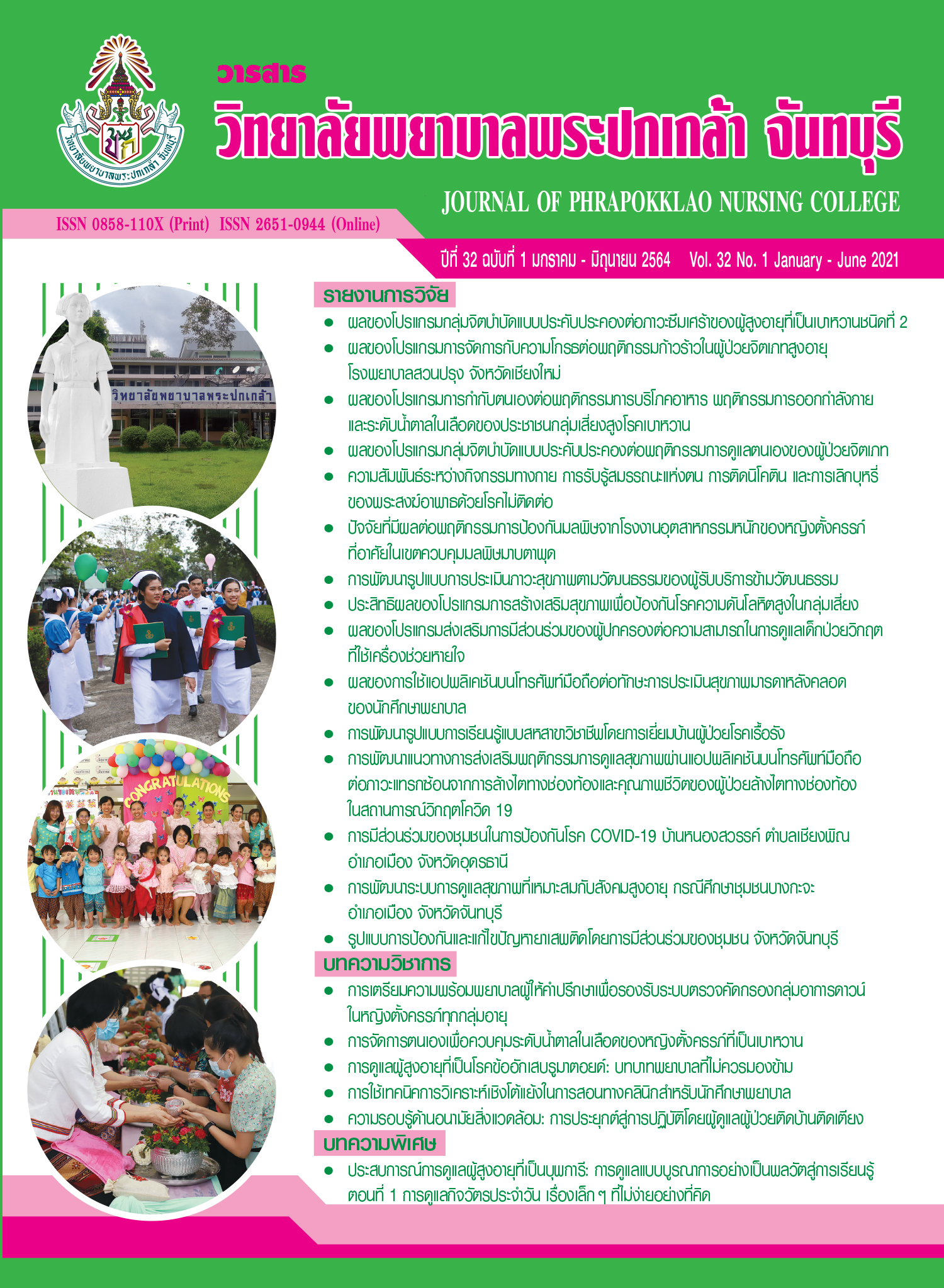Effect of the Anger Management Program on Aggressive Behavior among Elderly Patients with Schizophrenia, Suan Prung Psychiatric Hospital, Chiang Mai Province
Keywords:
Anger management, Aggressive behavior, Elderly patients with schizophreniaAbstract
This quasi-experimental research aimed to examine the effect of the anger management program on aggressive behavior among elderly patients with schizophrenia, Suan Prung Psychiatric Hospital, Chiang Mai Province. The samples consisted of 18 elderly patients with schizophrenia who received medical services at Suan Prung Psychiatric Hospital and were equally divided into the experimental group (n = 9) and the control group (n = 9). The research instruments included the anger management program, the Thai Version of Positive and Negative Syndrome Scale (PANSS-T) with reliability as .81, the Montreal Cognitive Assessment (MoCA), the demographic record form, and the Overt Aggression Scale (OSA) with reliability as .80. The implementation and data collection were conducted from October to December, 2019. Data were analyzed by frequency, percentage, mean, standard deviation, Fisher’s exact test, Wilcoxon signed-rank test, and Mann-Whitney U test.
The research results revealed that 1) after the experiment, the experimental group had statistically significant lower mean score of aggressive behavior than that of before the experiment (Z = -2.719, p < .01), and 2) after the experiment, the experimental group had statistically significant lower mean score of aggressive behavior than that of the control group (Z = -3.289, p < .01).
This research suggests that psychiatric personnel should apply the anger management program for reducing aggressive behavior among elderly patients with schizophrenia.
References
กรมสุขภาพจิต. (2558). แนวทางการดูแลผู้ป่วยจิตเวชที่มีความเสี่ยงต่อการเกิดความรุนแรง. นนทบุรี: ผู้แต่ง.
กรมสุขภาพจิต. (2561). สถิติผู้ป่วยโรคจิตเภท ปี พ.ศ. 2561. นนทบุรี: ผู้แต่ง.
ทศพล อะกะเรือน. (2559). ประสิทธิผลของโปรแกรมการจัดการกับความโกรธในผู้ป่วยจิตเภทที่ติดบุหรี่ โรงพยาบาลสวนปรุง จังหวัดเชียงใหม่. สืบค้นจาก http://cmuir.cmu.ac.th/handle/6653943832/39403?mode=full
ธนา นิลชัยโกวิท, สเปญ อุ่นอนงค์, ดารเณศ เกษไสว, และปราการ ถมยางกูร. (2543). เครื่องมือวัดกลุ่มอาการบวกและลบของโรคจิตเภทฉบับภาษาไทย (PANSS-T): การตรวจสอบความแม่นตรงและความน่าเชื่อถือ. จดหมายเหตุทางการแพทย์ฯ, 83(6), 646–651.
บุษยา ศรีวรรณ์. (2552). การศึกษาการใช้โปรแกรมการจัดการกับความโกรธและพฤติกรรมก้าวร้าวในผู้ป่วยจิตเภท โรงพยาบาลจิตเวชนครสวรรค์ราชนครินทร์ (วิทยานิพนธ์ปริญญามหาบัณฑิต). กรุงเทพฯ: จุฬาลงกรณ์มหาวิทยาลัย.
พยุงศักดิ์ ฝางแก้ว, และเพ็ญนภา แดงด้อมยุทธ์. (2562). ผลของการจัดการความโกรธที่เน้นการปรับความคิดต่อพฤติกรรมก้าวร้าวของผู้ป่วยจิตเภท. วารสารการพยาบาลจิตเวชและสุขภาพจิต, 33(1), 53–69.
พัชรนันท์ ชัยชาญทิพยุทธ. (2559). สภาพจิตใจที่เปลี่ยนแปลงไปเมื่อสูงวัยขึ้น. สืบค้นจาก https://medium.com/.../สภาพจิตใจที่เปลี่ยนแปลงไปเมื่อสูงวัยขึ้น-dd5714acc1c
พิเชฐ อุดมรัตน์, และสรยุทธ วาสิกนานนท์. (บ.ก.). (2552). ตำราโรคจิตเภท. สงขลา: ชานเมืองการพิมพ์.
ภัทราภรณ์ ทุ่งปันคำ. (2560). การพยาบาลผู้ที่เป็นโรคจิตเภท. เชียงใหม่: สมาร์ท โคตติ้ง แอนด์ เซอร์วิส.
มณฑาทิพย์ ชัยเปรม. (2556). รายงานเบื้องต้น: พฤติกรรมก้าวร้าวของผู้ป่วยจิตเวชและการจัดการของบุคลากรทางการพยาบาล. วารสารสุขภาพจิตแห่งประเทศไทย, 21(1), 57–65. สืบค้นจาก file:///C:/Users/Asus/Desktop/10146-ไฟล์บทความ-129416-1-10-20160428.pdf
โรงพยาบาลสวนปรุง จังหวัดเชียงใหม่. (2561). สถิติรายงานอุบัติการณ์ กลุ่มโรคจิตเภท ปี พ.ศ. 2561. เชียงใหม่: ผู้แต่ง.
โรงพยาบาลสวนปรุง จังหวัดเชียงใหม่. (2562). สถิติผู้ป่วยใน โรคจิตเภท ปี พ.ศ. 2562. เชียงใหม่: ผู้แต่ง.
สมบัติ ประทักษ์กุลวงศา. (2553). โปรแกรมการควบคุมความโกรธสำหรับผู้ป่วยโรคจิตจากสารเสพติด. วารสารสุขภาพจิตแห่งประเทศไทย, 18(2), 105–112.
สมภพ เรืองตระกูล. (2553). ตำราจิตเวชศาสตร์พื้นฐานและโรคทางจิตเวช (พิมพ์ครั้งที่ 2). กรุงเทพฯ: เรือนแก้วการพิมพ์.
หทัยรัตน์ ดิษฐอั๊ง. (2550). การสอนการจัดการกับความโกรธเพื่อป้องกันการเกิดพฤติกรรมก้าวร้าวในผู้ป่วยจิตเภท โรงพยาบาลพระศรีมหาโพธิ์ (การศึกษาอิสระปริญญามหาบัณฑิต). มหาวิทยาลัยขอนแก่น.
อรพรรณ ลือบุญธวัชชัย. (2556). การพยาบาลสุขภาพจิตและจิตเวช (พิมพ์ครั้งที่ 5). กรุงเทพฯ: วี.พริ้นท์ (1991).
อัครเดช กลิ่นพิบูลย์. (2556). การจัดการกับพฤติกรรมก้าวร้าว. สืบค้นจาก https://www.gotoknow.org/posts/520965
Cohen, J. (1988). Statistical power analysis for the behavioral sciences (2nd ed.). Mahwah, NJ: Lawrence Erlbaum Associates.
Hemrungrojn, S. (2007). The Montreal Cognitive Assessment, MoCA Thai version 15 March 2007. Retrieved from www.http://mocatest.org
Novaco, R. W. (1975). Anger control: The development and evaluation of an experimental treatment. Lexington, MA: Lexington Book. Retrieved from http://www.commonlanguagepsychotherapy.org/fileadmin/user_upload/Accepted_procedures/anger.pdf
World Health Organization. (2016). Schizophrenia. Retrieved from http://www.who.int/mental_health/management/schizophrenia/en/
Downloads
Published
How to Cite
Issue
Section
License
Copyright (c) 2021 JOURNAL OF PHRAPOKKLAO NURSING COLLEGE

This work is licensed under a Creative Commons Attribution-NonCommercial-NoDerivatives 4.0 International License.
เนื้อความ ข้อมูล และรายการอ้างอิงที่ผู้เขียนใช้ในการเขียนบทความเพื่อลงตีพิมพ์ในวารสารวิทยาลัยพยาบาลพระปกเกล้า จันทบุรี ถือเป็นความคิดเห็นและความรับผิดชอบของผู้เขียน คณะผู้จัดทำวารสารไม่จำเป็นต้องเห็นพ้องด้วยหรือร่วมรับผิดชอบ
บทความที่ได้รับการลงตีพิมพ์ในวารสารวิทยาลัยพยาบาลพระปกเกล้า จันทบุรี ถือเป็นลิขสิทธิ์ของวารสารวิทยาลัยพยาบาลพระปกเกล้า จันทบุรี หากหน่วยงานหรือบุคคลใดต้องการนำส่วนหนึ่งหรือทั้งหมดของบทความไปเผยแพร่ต่อเพื่อวัตถุประสงค์ใด ๆ จะต้องได้รับอนุญาตจากบรรณาธิการวารสารก่อน



